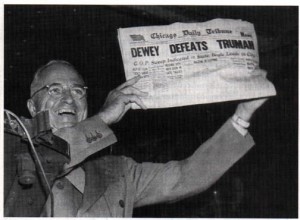Continuing our February theme, this week’s post again gives you an opportunity to play copy editor. Examine the following three excerpts from recent newspaper articles and consider what you might change.
1. While many Clevelanders were excited about and pleased with the vote, others were hesitant to celebrate the vote as a victory and wary about challenges that lay ahead.
2. Upon arriving at the boarder your driver will walk you across to Tijuana where you’ll board a local bus for a 10 minutes ride to the Avenida Revolucion.
3. (A headline) Gophers’ Banham ties womens’ record with 60 points
1. While many Clevelanders were excited about and pleased with the vote, others were hesitant to celebrate the vote as a victory and wary about challenges that lay ahead.
A) Some writers are comfortable with phrasing that requires two prepositions, like “excited about and pleased with.” I’m not because I find the wording labored and often unnecessary. Here, for example, what is so different about “excited” and “pleased”? Why not use just one? (And because “excited” and “exciting” tend to be overused, I’d opt for “pleased.”)
B) Did you catch the error that might not be considered an error in a generation or two? With so many speakers and writers using “lay” for “lie,” the rule seems to be weakening, but newspapers shouldn’t make the error, and neither should those of us who pride ourselves on correctness.
So remember: “Lay” takes a direct object, as when a chicken lays an egg or you lay your keys on the counter. That’s not the case here, so we want “challenges that lie ahead.”
2. Upon arriving at the boarder your driver will walk you across to Tijuana where you’ll board a local bus for a 10 minutes ride to the Avenida Revolucion.
A) This one’s funny, right? “Board” is correct but not “boarder.” The writer meant “border.”
B) I think the word after “Upon arriving at the border” should be “you.” Yes, you and your driver will arrive there together, but this isn’t about the driver; it’s about the traveler: you.
C) This sentence needs at least one comma, after Tijuana, and probably one after “border,” but we can eliminate the need after “Tijuana” by substituting the more economical “to board” for “where you’ll board.”
D) “A 10 minutes ride” is passable, but the usual phrasing is “a 10-minute ride.”
This, then, could be the edited version: Upon arriving at the border, you and your driver will walk across it to Tijuana to board a local bus for a 10-minute ride to the Avenida Revolucion.
3. Gophers’ Banham ties womens’ record with 60 points
Yes, we are supposed to place the apostrophe after the “s” to show possession in “Gophers’,” but we don’t make “woman” plural by a adding an “s.” We change it to “women.” So without an “s” we make “women” possessive the same way we treat a singular possessive word: by putting the apostrophe inside the “s.” Therefore, when Rachel Banham scored 60 points for Minnesota against Northwestern, she tied the NCAA Division I women’s record.
In addition to presenting workshops on writing in the workplace, Norm is a writer, editor, and writing coach. His 100+ Instant Writing Tips is a brief “non-textbook” to help individuals overcome common writing errors and write with more finesse and impact. Learn more at http://www.normfriedman.com/index.shtml.

